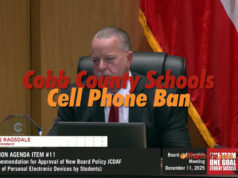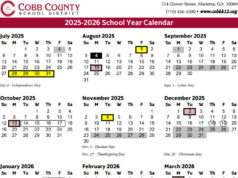
For students, summertime means long days at the pool, play dates and camps. After a summer of fun and relaxation, the school year—and the routine that comes along with it—often creeps up on students and parents. The transition from summer vacation to the first day of school can be a difficult one, but with a little bit of exercise, a balanced diet and a summer routine, students can easily fall back into the school schedule.
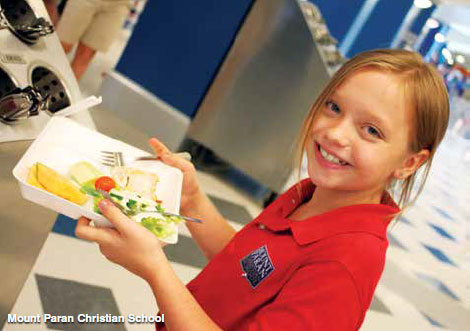 “Get in some type of routine, saying ‘this is your normal time each day when you’re going to do this,’” says Eric Bradley, high school principal at Mount Paran Christian School in Kennesaw. “Having some type of routine pattern would help dramatically.” Establishing a routine with your child can be as simple as establishing certain times to read a book, complete math problems or just watch a movie. Bob Montague, high school principal at Mt. Bethel Christian Academy in east Cobb, stresses the importance of giving students a break from the school routine but emphasizing the importance of learning. “Whether they’re involved in summer camps, jobs, internships, volunteering or whatever interests them, they need to be active and involved in something of value to themselves and others,” Montague says.
“Get in some type of routine, saying ‘this is your normal time each day when you’re going to do this,’” says Eric Bradley, high school principal at Mount Paran Christian School in Kennesaw. “Having some type of routine pattern would help dramatically.” Establishing a routine with your child can be as simple as establishing certain times to read a book, complete math problems or just watch a movie. Bob Montague, high school principal at Mt. Bethel Christian Academy in east Cobb, stresses the importance of giving students a break from the school routine but emphasizing the importance of learning. “Whether they’re involved in summer camps, jobs, internships, volunteering or whatever interests them, they need to be active and involved in something of value to themselves and others,” Montague says.
Mount Paran hosts summer camps, such as Camp Wannago, that promote activity and socialization between students. Both Mt. Bethel and Mount Paran have mission trip opportunities available for children of all ages.
Tawanna Rusk, lower school principal at Mount Paran, agrees that summers should be productive but also emphasizes the importance of summer relaxation. “You want to make your summer time productive and you want to have some sort of a schedule but it is a time to rest. It’s okay to schedule nothing. In my opinion, that’s what the beauty of summer is. There’s a lot of benefit in just resting,” Rusk says. “You don’t want [your children] to feel like school never ended. It shouldn’t be so intense that there’s no break whatsoever. You have to make it somewhat fun.”
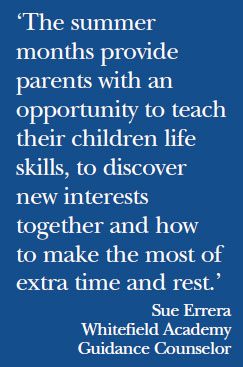 Sue Errera, a guidance counselor at Whitefield Academy in south Cobb, says parents should schedule time for students to indulge in summer fun, but to take time to be productive. “It’s important to bear in mind that children are still students during the summer months,” she says.
Sue Errera, a guidance counselor at Whitefield Academy in south Cobb, says parents should schedule time for students to indulge in summer fun, but to take time to be productive. “It’s important to bear in mind that children are still students during the summer months,” she says.
Here are some tips from administrators and teachers on how parents can help their students establish a schedule that will make the transition to fall easier:
Get Enough Sleep
Students often go to sleep later and sleep in during the summer—and that’s okay, but getting enough sleep is crucial for children to be rested and ready for the school days. “Even on a more relaxed schedule, you’re going to allow your kids to stay up a little later, sleep in a little longer, but still trying to have some structure,” Rusk says.
It’s important to establish a time when your children must go to sleep and must wake up—even if it is a little later than normal. “Sleep affects so much for a child; 7 – 12-year-olds require 10 – 11 hours of sleep a night,” says Marie Black, second-grade teacher at Mt. Bethel. “The average child receives only 8 – 9 hours of sleep a night. We see, as teachers, that children with a lack of sleep are affected academically, socially and physically during the school day.”
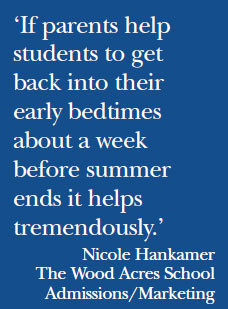 Montague and Nicole Hankamer, with admissions/marketing at The Wood Acres School in east Cobb both agree that transitioning from summer to school sleep schedules can be difficult. “If parents help students to get back into their early bedtimes about a week before summer ends it helps tremendously,” Hankamer says.
Montague and Nicole Hankamer, with admissions/marketing at The Wood Acres School in east Cobb both agree that transitioning from summer to school sleep schedules can be difficult. “If parents help students to get back into their early bedtimes about a week before summer ends it helps tremendously,” Hankamer says.
Travis Mozingo, director of sports performance at Mount Paran, emphasizes the importance of sleep, but also the time of the day that children do finally put their head on the pillow. “Turn off your Xbox, get off of Snapchat and sleep 8 – 10 hours,” he says. “[Students] think 10 hours is sleeping from 2 a.m. to noon, which is not the same as sleeping from 10 p.m. to 8 a.m.”
With a structured sleep schedule and a transition right before school starts, students can be prepared for the first day of school wake-up call.
Eat a Balanced Diet
Eating well shouldn’t only be a rule during the school year; students need to eat a balanced diet during the summer, as well. Mozingo suggests making sure your children stay active, which speeds their metabolism and encourages movement. “At my house, I don’t throw a fit about my kid having a handful of cookies if they’re being active,” he says. “They don’t need to be miserable as far as their diet goes. ”But, Mozingo stresses that it’s important to eat balanced meals. “We try to educate kids about what they’re consuming.”
The most recommended advice from teachers and administrators: Avoid packaged foods, drink more water and eat breakfast every day, which Rusk says middle and high school kids sacrifice most often. “You can tell. The kids don’t have any energy,” says Steve Shelton, middle school principal at Mount Paran. “Our kids who don’t need sugar get sugar, and we can tell that. I would like parents to partner with us a little bit better about their children’s nutrition, because we definitely see the effects in the classroom.”
Errera suggests that students be in control of their diet and to establish structure. “To engage children in healthy eating patterns, ask children to choose a healthy recipe, then shop for and prepare the dish as a summer activity,” Errera says. “Employing a somewhat structured schedule during the summer months lends itself to keeping a healthy eating routine.” It’s recommended to educate children about why hydrating, eating a balanced meal and eating breakfast is important to staying healthy.
Stay Active
Student-athletes are not the only ones who should stay active during the summer. Spending time outside, going to the pool and joining summer sports leagues are all great ways to get students moving. Errera suggests limiting summer lounging and encouraging activities that keeps students active. “Only permit children to lounge for extended periods of time during vacation weeks, and be creative during the remaining weeks!” she says.
Being creative can mean anything from outdoor activities to family outings that students don’t typically get to participate in during the school year. “You may choose to sign up for an event as a family, invest in passes to an indoor rock climbing wall or encourage swimming, biking and hiking,” Errera adds. “Since children may not have an opportunity to participate in these more time-consuming activities during the school year, being able to enjoy them during the summer months can seem more like a treat than required exercise.”
Above all, make sure that your children are enjoying their summer activities. “Work with your child and a friend or two to establish a way for them to get involved in something that interests them,” she says.
Read Every Day
Whether or not students are required to read over the summer, setting aside a time to read every day greatly benefits the student. “Reading is the best way to stay on track during the summer months,” Hankamer says. Reading daily—whether it be a book for pleasure or required reading—is an excellent way to promote critical thinking and spend more time with parents.
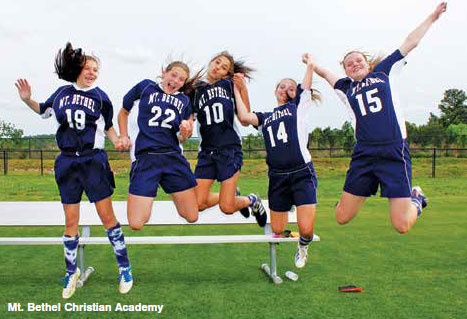 Mt. Bethel first-grade teachers Christi Meara and Lindsey Neuman suggest that parents read out loud to their children and make sure their child reads to themselves every day. Parents are also encouraged to ask comprehension questions afterward. “Reading daily should become an enjoyable habit for every child,” Black says. “Watching their parents read is the best way to model a love for reading. Make reading a priority in your home every day of the year.”
Mt. Bethel first-grade teachers Christi Meara and Lindsey Neuman suggest that parents read out loud to their children and make sure their child reads to themselves every day. Parents are also encouraged to ask comprehension questions afterward. “Reading daily should become an enjoyable habit for every child,” Black says. “Watching their parents read is the best way to model a love for reading. Make reading a priority in your home every day of the year.”
Promote Critical Thinking
Just because your kids are out of school doesn’t mean they shouldn’t have meaningful conversations. For high school students, that can mean a chat about future plans and college. For younger students, inspire conversation after going to see a movie or listening to a sermon. “I think kids benefit from being made to think and resolve and figure things out. I think that conversation should be challenging, whether on vacation or going to the grocery store or church or wherever,” Shelton says. “Spark conversation that keeps them engaged.”
This type of conversation can happen anywhere and anytime, and for juniors and seniors in high school, it could lead to meaningful conversation about the future. “If you go on a family vacation, check out whatever local university,” Rusk suggests. “Touring college campuses leads to really great conversation with your kids about what are they thinking they might want to do.”
Encouraging critical thinking not only works your student’s brain but also gives you a chance to have quality conversations. “The summer months provide parents with an opportunity to teach their children life skills, to discover new interests together and how to make the most of extra time and rest,” Errera says. “This may require parents to reroute their energies, but the memories and outcomes from your lesson plans will make it well worth it!”













